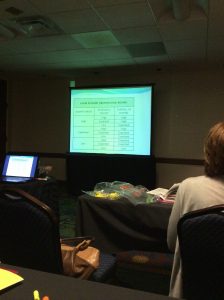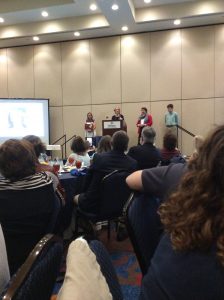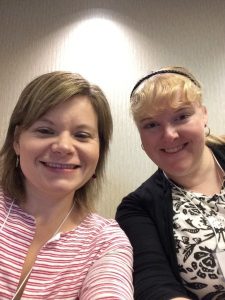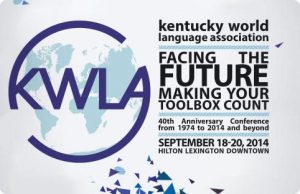It’s a wrap!
I was back at my “home conference” in September for the 2014 Kentucky World Language Association annual conference and it felt like I hadn’t missed a beat- in a very good way. I got to hang out with old friends and make fantastic new ones, help and be helped, take a few minutes away from kids and learn with the best. For your benefit and mine, here’s an attempt at organizing my takeaways from this conference.
Share
From some sessions I went to:
- Kentucky is using a new teacher evaluation system called TPGES. I’ve had some questions about it and went to the session to learn more so I could be more helpful than “I have no idea what you’re talking about.” So now I have some idea of what you’re talking about. Summary: keep being effective, resist the temptation to choose what will work for you instead of what’s communicative and focused on your students’ real proficiency, and don’t let administration or other teachers drag you into making this another bureaucratic pile of words on trash paper or disk space that may or may not reflect how you actually teach in your classroom and who cares anyway.

TPGES outcomes linked to evaluation
Reflect on yourself, and change if you need to, and do it slowly. - The new JCPS curriculum documents were still not available (boy that was a downer) at the conference but it seems they’ve quietly gone live since the conference… I think. In any case, take what works, do what you know, reflect on yourself, and change if you need to. And do it slowly.
From my sessions:
- Create realistic assessments:
Session’s “Twitter pitch” (the message in 140 characters or less): When assessments let students see themselves using language in a realistic situation, learning is more fun and lasting.
Here’s a linoit board with suggestions from participants (and you, my awesome PLN!) of how we’ve actually used our language without traveling abroad. Because let’s face it, renting an apartment in Madrid or creating your own clothing advertisement – don’t get me started on Picasso dioramas – are not exactly realistic linguistic production for the vast majority of our students. I’m not saying there’s not something to be said for fun projects that motivate, but for production assessments, let’s keep it real.
Notice a lot of these are adult uses of language, because, well, my responders were adults. Can you think of reasons our teenagers (or younger kids?) would actually use language? In the seminal article in the Language Educator, the queen of the IPA wrote about a sample assessment in which elementary children are encouraged to imagine they’re doing something in their future profession. Um, not something a lot of fourth graders are into right now. Why would a fourth grader actually use Spanish? Let me know what you think.
We used these ideas as a springboard to brainstorm realistic assessment scenarios for common units. Some participants gave me great ideas which have been added to the Camp Musicuentos wikispace, linked below.
Here’s the Prezi, if you like. - Curriculum planning outside the textbook:
Session’s “Twitter pitch”: With or without a textbook, you can pace, plan, and execute engaging, proficiency-based curriculum without being overwhelmed.
We had a fantastic time in this session. Those three hours went so fast and we accomplished a lot and not enough! I can’t wait to see some of them at Camp Musicuentos (speaking of which, come to Camp Musicuentos). We added two great IPA ideas to the Camp Musicuentos wikispace, on the Level 1 page, including one that would work for any language (and for my family would actually need to be Arabic – loved having a UK Arabic professor in the session!). Note the link to a document with activities for the novice level familyish unit (listed as Unit 3).
Here’s the Keynote, if you like.
Random lessons
- My PLN colleague Jordan Yeager wasn’t at KWLA (boo) but explored with us via Twitter anyway. While looking at something he noted, “A crappy textbook curr[iculum] made all pretty w/ nice fonts is still crappy curriculum.” Yes. Great if it looks good, but keep it real, too. It’s worth noting that the opposite is true – I saw some pretty fantastic stuff helping novices interact with authentic resources that didn’t look like it was developed by graphic design specialists because, well, it wasn’t, but it was still fantastic for learning. We can’t all be Zachary Jones (we all love you, Zachary).
- We’ve heard it, we’ve said it, but apparently not all of us believe it; in the BYOD (bring your own device) movement we believe that cheating is a heart problem, not an equipment problem, and the same goes for respect. If we don’t teach students how to use devices respectfully, but instead we use our authority to simply take them away, and we strong-arm them into silence instead of teaching respect for the people speaking, we’ll end up with adults (teachers) who sit in an awards luncheon and completely ignore / talk over recognition of amazing colleagues who are fighting and winning big, important battles. Next time you’re in a conference session, at an awards luncheon, or in a faculty meeting, remember how much you wish your students would learn to respect you when you’re speaking, even when you’re boring them, even when they don’t care. And remember that when you’re talking to the person next to you, you’re either making them share in your distraction or forcing them to figure out a polite way to tell you to shut up so they can show some respect. /soapbox
- If you know you’re going to eat cheesecake, enjoy it more by knowing you’ve earned it; get up at 6 and hit the hotel fitness room. Better yet, bring along a friend (maybe one day I’ll be able to run as far as you, Jana).
- When will conference hotels enter the 21st century and offer free in-room wifi like every little Holiday Inn Express does?
- It’s not all about work. Go out for dinner with new and old friends and tell stories that don’t have anything to do with school. Enjoy the festival and dance. No one’s really looking at you (unless you’re on the stage, and then you just volunteered for the audience!). But at the festival do not pay $50 for a fantastically attractive Ecuadorian pullover if it scratches your arms like a briar patch. You know you won’t wear it.

- Even while you’re having fun, be a professional the whole time. Watch your conversation while you’re drinking too much in the hotel bar at night. If I feel like listening to your casual conversation is a complete waste of time, I probably don’t want to hear your “professional” pitch either.
- Speaking of respect, regardless of what you’re there for, be quiet in your hotel room at 2 A.M. Remember that walls are thin and the people in the room next door might have to get up at 6 for work and even if they didn’t they didn’t sign up to listen to you… whatever. I refuse to elaborate.
- When a conference is over, go home and relax with your family and/or friends. You have plenty of time to implement all the great ideas you’ve gotten. Give yourself some time to let it all soak in.
I hope to see you at a conference this year!
1 Comments
Comments are closed.





Thanks so much for your observations! I am out of town for our local conference this year, but I loved reading your observations. Also, I am with you in regards to wifi! Why is it always so difficult?! The worst is when you are at a tech conference that doesn’t offer free wifi!